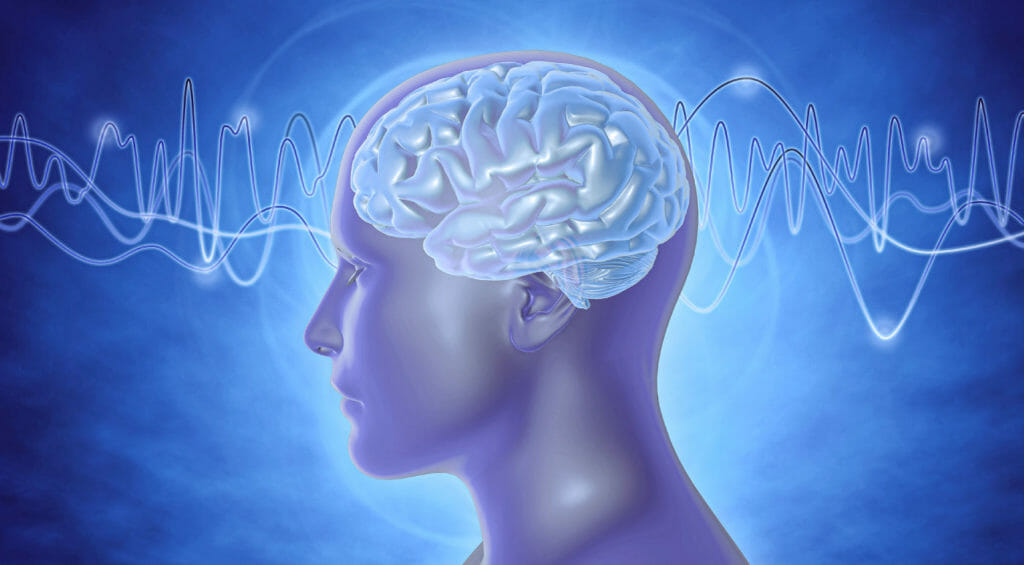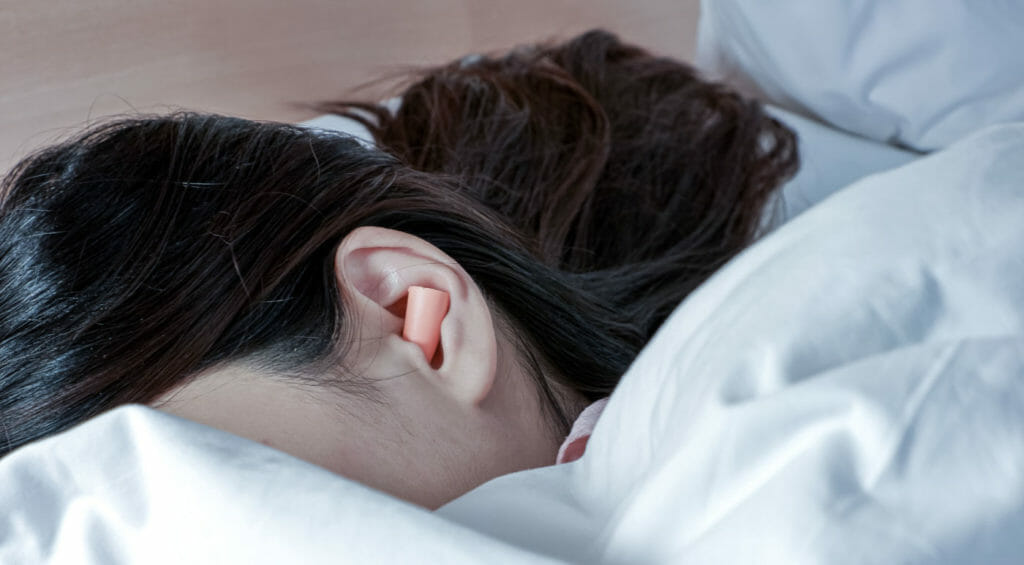
Looking for easy ways to sleep better? One simple option is to consider listening to specific sounds to help you sleep.
Our reactions to sound are relative, and a sound I find relaxing might feel distracting to someone else. For example, do you think the sound of ocean waves would lull you to sleep… or would it make you think about when you could take a beach vacation?
But once you find the right ones for you, good, soothing sounds can promote relaxation and help you fall and stay asleep. Let’s take a closer look at the effects of sounds on our sleep, as well as the best sounds to help you sleep better.
How Sounds Help Sleep

The effects of sound on sleep depends on the intensity and type of sound. Remember that sleep is simply a change in your brain waves, and sounds act directly on those brain waves.
Here are the types of brain waves and how sounds affect them:
Beta Brain Waves
Beta waves are fast and support alertness, attention, and focused mental activities such as problem solving and decision making.
Higher-frequency sounds and music can promote beta waves and keep you stimulated and engaged. That means these sounds won’t help you sleep, but they’re great for helping you wake up in the morning.
Alpha Brain Waves
Alpha waves represent calm and relaxation, the resting state for the brain. When you are truly feeling relaxed, this is the frequency that promotes your imagination, visualisation, memory, and learning.
Musical sounds promote alpha waves and allow you to transition from a beta/hyperactive state into deep relaxation. These are great sounds to help you sleep.
Theta Brain Waves
Meditation and lighter sleep induce theta brain waves. In theta, the brain draws energy inwards and focuses on coordinating dreams and sorting out any unresolved neural connections (ideas and thoughts we fear and have not resolved). Ultimately, theta waves help empty negativity and troubling thoughts out of our consciousness.
Music has been shown to affect theta waves, so you could try listening to soothing, calm music before bed.
Delta Brain Waves
The slowest frequency experienced in deep, dreamless sleep is delta. Delta sleep is where body rejuvenation and restoration happens. Meditative sounds have been shown to induce delta brain waves.
Remember that your body and brain will naturally transition from beta to alpha to theta and finally to delta brain waves as you wind down and fall asleep. It’s worth experimenting with different kinds of music and sounds to see how they affect how you feel, so you can figure out which sounds help you sleep.
How to Listen to Sounds for the Best Sleep

How the sound arrives at your ears also plays a role. Typically, we experience sound after it has travelled through the air from wherever it originated.
However, sound travels better through water than air, and even better through solid matter. Listening to the sounds directly in your ears through headphones will have a stronger effect on your brain waves than listening from afar.
The Best Sounds to Help You Sleep
Finding the best sounds to help you sleep can take a bit of trial and error. You might need to listen to a few types of sounds and see how they affect you. Do you feel calm and relaxed, or did that particular sound make you feel more alert or engaged?
Some people like to listen to nature sounds to fall asleep, while others like customized sounds such as a loved one’s snoring. Here are some of the most common sounds that help you sleep.
White Noise
White nose is a sound that masks other sounds, such as the whirr of a fan. While comparing the incidence of white noise on sleep among ICU patients, this study found that patients had fewer arousals with white noise compared to irregular hospital sounds.
Pink Noise
Pink noise simply means sound with an equal distribution of frequency, such as a sound of a river, where the sound is similar from start to finish. Some people find this kind of noise to be less distracting than white noise.
Silence
Yes, silence is also a form of sound. Sometimes all you need to fall asleep is to stay silent and let your mind calm down to initiate your sleep cycle. Silence can be hard to achieve sometimes, especially if you live in a busy city or apartment building. Earplugs can come in handy.
Heartbeat Sounds
If you wear earplugs, you might have noticed that your heartbeat seems louder. For some people, listening to their own heart’s beats helps keep their mind from wandering so it can focus on sleep.
Music
Perhaps you’re someone who loves listening to music before bed. If there’s a certain kind of music that lulls you to sleep, try listening to it as you get ready for bed and maybe leaving it on while you sleep.
Meditative Sounds
Many people find it hard to stop their minds from racing at night. Often, this is due to the accumulation of ideas throughout the day and not having enough time to address every thought as it comes.
Before bed, take the time to listen to a meditation that aligns with your thought process or guides you through a relaxation exercise. This will help you wind down and prepare your mind for sleep.
Sound Management Tips for Better Sleep

Control Outside Noise
While sleeping with your window open can help keep you at the right sleeping temperature, it can also allow outside noise to interrupt your sleep. Instead, open the window a few hours before bedtime to allow cool air to circulate inside your bedroom, and then close it right before bed.
Earplugs are also a great option if you live close to train tracks or busy roads, or if you know it will be a noisy night, like New Year’s Eve.
Control Inside Noise
Other family members or roommates might still be awake when you’re ready to go to sleep, and they could make noise. A slamming door or whirring coffee grinder are definitely not sounds that will help you sleep!
Closing doors can be helpful, as can negotiating times when no one in the house will use the dishwasher, washing machine, espresso machine, etc.
Bad Sound for Sleep
Studies show that chronic exposure to high levels of environmental noise have an increased risk of cardiovascular diseases such as myocardial infarction. The intensity of sound is measured in decibels, and studies show that low as 30 decibels can affect sleep and health. Notice what sound frequencies calm you down the most, the next time you listen to your favorite sound.
Can Some Sounds Hurt Your Sleep?
While there are certain sounds to help you sleep, others can actually keep you awake or negatively affect your sleep.
High-frequency sounds can activate your brain waves away from relaxation and keep you awake. This kind of noise is likely to wake you up during stage 2 sleep, and since we spend half the night in this stage, there’s a lot of opportunity to wake up.
Also, older people and children are more vulnerable to sound disturbances so it’s especially important to help them avoid high-frequency sounds while they’re sleeping.
Another study found that when people were exposed to similar noises over and over again, they experienced fewer changes in their brain waves but still showed heart rate arousal. So while you might get used to distracting noises, they will still physiologically arouse you and trick your body into being more awake. Even if you’re not aware of it, these sounds can mess with your sleep, leaving you exhausted and unproductive the next day.
If you’ve tried mind and body relaxation techniques before bed and listening to sounds to help you sleep, and yet you still have trouble sleeping, you might want to talk to an expert. Consult your doctor and/or a sleep coach for suggestions on how to sleep better and wake up feeling refreshed and relaxed.